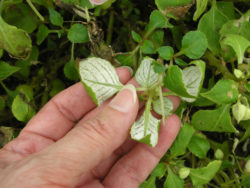After nearly a decade of decline and reduced availability, it seems that the beloved Impatiens plant is finally making a comeback.
Impatiens walleriana, commonly called Impatiens, has historically been one of the most popular annual bedding plants in the country. A longtime favorite of gardeners, Impatiens are easy to grow and provide beautifully-colored blooms in shady conditions. The name Impatiens comes from the Latin word for impatient, undoubtedly chosen for the violent way in which the original perennial plant’s seeds discharge from its ripe pods.
 Eight to ten years ago, Impatiens became susceptible to downy mildew – a mold (Plasmopara obducens) that thrives in cool, damp conditions and first appears as a white, downy coating of spores on the undersides of leaves. The disease was so rampant that impatiens production drastically declined among growers. With little chance of planting Impatiens wallerina with confidence, growers, landscapers, and gardeners alike abandoned it for other colorful shade alternatives like Begonias, Coleus, and New Guinea Impatiens (which aren’t susceptible to downy mildew).
Eight to ten years ago, Impatiens became susceptible to downy mildew – a mold (Plasmopara obducens) that thrives in cool, damp conditions and first appears as a white, downy coating of spores on the undersides of leaves. The disease was so rampant that impatiens production drastically declined among growers. With little chance of planting Impatiens wallerina with confidence, growers, landscapers, and gardeners alike abandoned it for other colorful shade alternatives like Begonias, Coleus, and New Guinea Impatiens (which aren’t susceptible to downy mildew).
During this time, seed companies have been working to produce an improved Impatiens seed that is resistant to downy mildew. One company, PanAmerican Seed, has succeeded and 2019 is the first year that a new strain, Beacon® Impatiens, has become available. Focal Pointe planted this new seed at several properties that have shady areas in need of color. The new Beacon® Impatiens have been extremely successful, producing lots of blooms with no sight of downy mildew.
![]() “Beacon® Impatiens is truly an effort years in the making. Since the early days of the devastating disease, greenhouses have been waiting for the chance to bring Impatiens back,” said Anne Leventry, president of PanAmerican Seed. “To bring Beacon to market with proven high resistance to Impatiens downy mildew, we are confident that our greenhouse customers, retailers, and gardeners alike will also have the confidence to grow garden Impatiens once more.”
“Beacon® Impatiens is truly an effort years in the making. Since the early days of the devastating disease, greenhouses have been waiting for the chance to bring Impatiens back,” said Anne Leventry, president of PanAmerican Seed. “To bring Beacon to market with proven high resistance to Impatiens downy mildew, we are confident that our greenhouse customers, retailers, and gardeners alike will also have the confidence to grow garden Impatiens once more.”
